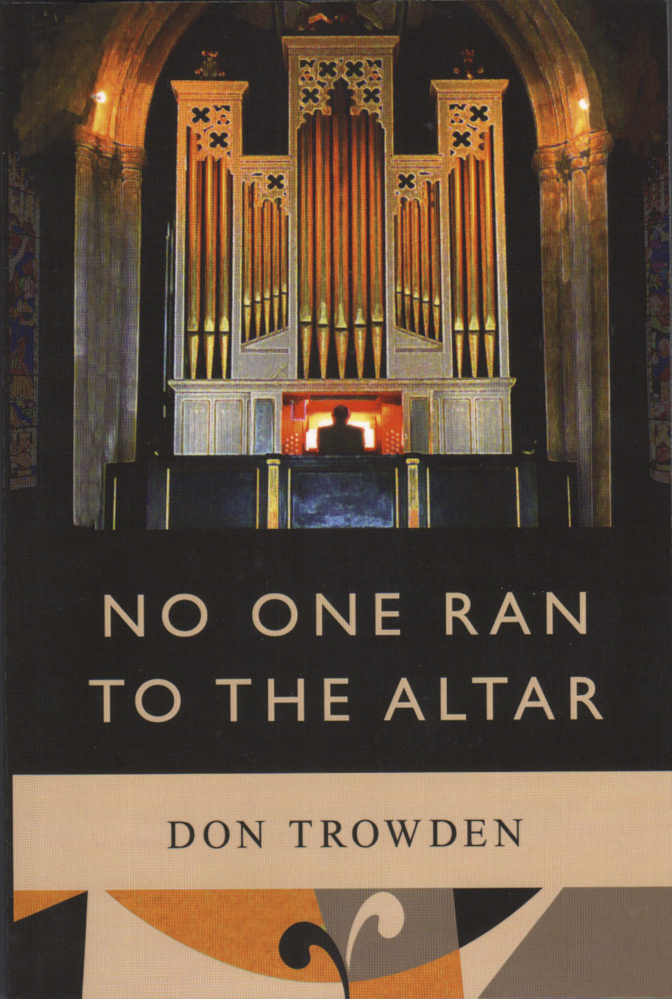Caleb Mason likes sentences that finish well, that take readers on a journey that pays off on the final word. He devotes careful attention to musicality and edits his writing with the aim of creating a varied flow.
Using the pen name Don Trowden, Mason begins his latest novel with this gem of a sentence: “One son walked out the door never to return as another son walked in.” “No One Ran to the Altar” is the second in a family trilogy that tells the tragic and darkly comedic downfall of the once-proud Pendergrasts.
“I was not planning to write a new novel, but that sentence got me started,” said Mason, who was driving when the sentence came to him. “I pulled off at the next exit and emailed it to myself for later attention before it evaporated. Yes, another muttering lunatic in the car.”
Mason, who lives in Cape Elizabeth and Vinalhaven, published his novel through Publerati, an e-book publisher that he founded and operates. He’s published about a dozen novels in four years. This week, Mason will speak at the Digital Book Printing Conference in New York City. He will talk about making the publishing process less expensive, alongside publishers that manage huge inventories of titles.
Prior to his career in publishing, Mason worked in consumer photos and paper mapping, two industries absorbed by digital technologies. In addition to selling e-books, Publerati makes paperback copies available through on-demand printing, both in-store at about 100 bookstores nationally and through online orders. Maine bookseller Sherman’s Books and Stationery also sells paperback copies. Mason sat down at Rosie’s recently to talk about his book and digital publishing.
Q: “No One Ran to the Altar” is the middle book in a family trilogy. When you wrote the first book, “Normal Family,” did you realize it would be the first of three? I’m curious how you saw the story early on and how it has evolved.
A: I did not envision a trilogy. It was difficult enough writing “Normal Family,” especially given the constraints of the first-person narrative from the point of view of a 10-year-old boy. It took me 10 years to complete while working full-time and raising a family.
I believe I had been subconsciously noodling the idea of writing a holiday novel for much of my adult life. I was walking the track one day after work, when one of those mysterious “what-ifs” hit me. What if I wrote a novel set entirely over four consecutive dysfunctional holidays in the late 1960s, juxtaposing the family chaos against the nation’s? Could I create a narrative arc that moved from innocence to maturity in just one amusingly difficult year? That was the challenge.
Q: Why did you write this second novel? Or the better question, perhaps, is who are these people and why did you create them?
A: “No One Ran to the Altar” is a cathartic novel, which was born from the waste of my brilliant brother’s suicide. Art as catharsis is often the best art. But fiction needs to be larger than life, without disconnecting to the point that readers find it unbelievable. So I introduced the narrative tension of whether the war-hero father came back from World War II a serial rapist. And then created the characters of Chloe and Sasha to add humor and tie them into the truths about the father and the family. This is a novel about father and son betrayals, and the betrayal at the end recasts what came before in both volumes. That ending was a surprise to me so should be for the reader as well.
Q: Why do you write?
A: It’s the most challenging personal activity I undertake in an otherwise mostly mundane life. And, apparently, because I can’t stop. And because of the thrill and sense of accomplishment one feels when something promising is well underway and the characters are with you constantly. When the story starts writing itself, heading into unexpected places. For the excitement brought on by the creative process.
Q: Why is Maine a magnet for writers?
A: Creating art is a solitary endeavor. Whether composing music, a painting, or a novel, removing oneself from the bustle of life to a beautiful place helps one focus on what is important in life. I did a good deal of thinking about my new novel on Vinalhaven. Walks in the fog. Kurt Vonnegut said writing a novel is like driving in the fog; you can make the entire trip by seeing just far enough ahead as you move forward. It’s just like life. No one knows exactly how it will end, but most likely it will be a surprise. Meanwhile, we put one foot in front of the next.
Q: What books are you reading now?
A: I’m rereading Lily King’s wonderful novel “Father of the Rain,” which is an exploration of a complex father-daughter relationship. My novel “No One Ran to the Altar” is an exploration of a complex father-son relationship. Her novel is well worth rereading and studying, which is what I do with any interesting work I encounter. One reading is never enough and unfair to the author. I’m also rereading “The Jungle” by Upton Sinclair, you know, to help reduce the amount of hot dogs I eat.
Q: You published this as an e-book through Publerati, your literary publishing house. It’s also available locally and nationally through on-demand printing. What is that all about?
A: Literary reading is in decline. The National Endowment for the Arts recently reported that reading for pleasure has fallen to the lowest levels in three decades. I started Publerati as a place for writers of literary fiction to bring novels to market in new ways, to test new ideas and to pay the authors much better royalties. It’s become what some have called an authors’ commune. Most established literary authors do not need a place like Publerati yet, but I hope to be around when further retail and publisher consolidation further limits their access.
On-demand printing is important to reducing publisher and bookstore costs to be able to pay authors better royalty rates. The way publishing has worked for years is to load in as much retail inventory as possible, hope that 80 percent actually sells through, and then the bookstore returns what didn’t sell. The problem with this model for literary authors with smaller audiences is, if only 60 percent sells, the publisher will oftentimes prematurely declare the work out-of-print so the bookstores cannot receive credit for what they originally bought. The churn of returns has many hidden costs for both the store and the publisher. The real loser is the author. I’m hoping to find better ways for literary fiction to survive as digital change advances.
Q: Where does Publerati fit into your career? You’ve worked in traditional publishing houses, as well.
A: I’ve become a cobbler as I wobble toward retirement. I cobble together a living working in tourism for the Greater Portland Convention and Visitors Bureau, promoting our region, which is a joy to promote, and then my publishing business and as a writer. I love it all. I have ADD, for sure.
I have worked in five different industries. That provides me with an outsider’s point of view, which some value and some dismiss. Change is never easy. I am not interested in creating another small publisher just like all the others. I am free to build something new from scratch, preparing for what I see as a very different future for many authors. I am free to experiment on my own titles, and then if something works, bring it to the other authors. And if it fails, don’t tell them.
Q: Last question: Why Don Trowden as a pen name?
A: How great to have a pen name that captures the mood of my writing, the name itself being simultaneously humorous and sad, as are the novels. Oftentimes people hear it, and chuckle at the humorous presentation of what is a bittersweet commentary on the nature of human life. We are all Don Trowden. I still cannot believe I am the only Don Trowden, as it turned out after I Googled it. There are clearly too many Caleb Masons.
Copy the Story LinkSend questions/comments to the editors.





Success. Please wait for the page to reload. If the page does not reload within 5 seconds, please refresh the page.
Enter your email and password to access comments.
Hi, to comment on stories you must . This profile is in addition to your subscription and website login.
Already have a commenting profile? .
Invalid username/password.
Please check your email to confirm and complete your registration.
Only subscribers are eligible to post comments. Please subscribe or login first for digital access. Here’s why.
Use the form below to reset your password. When you've submitted your account email, we will send an email with a reset code.